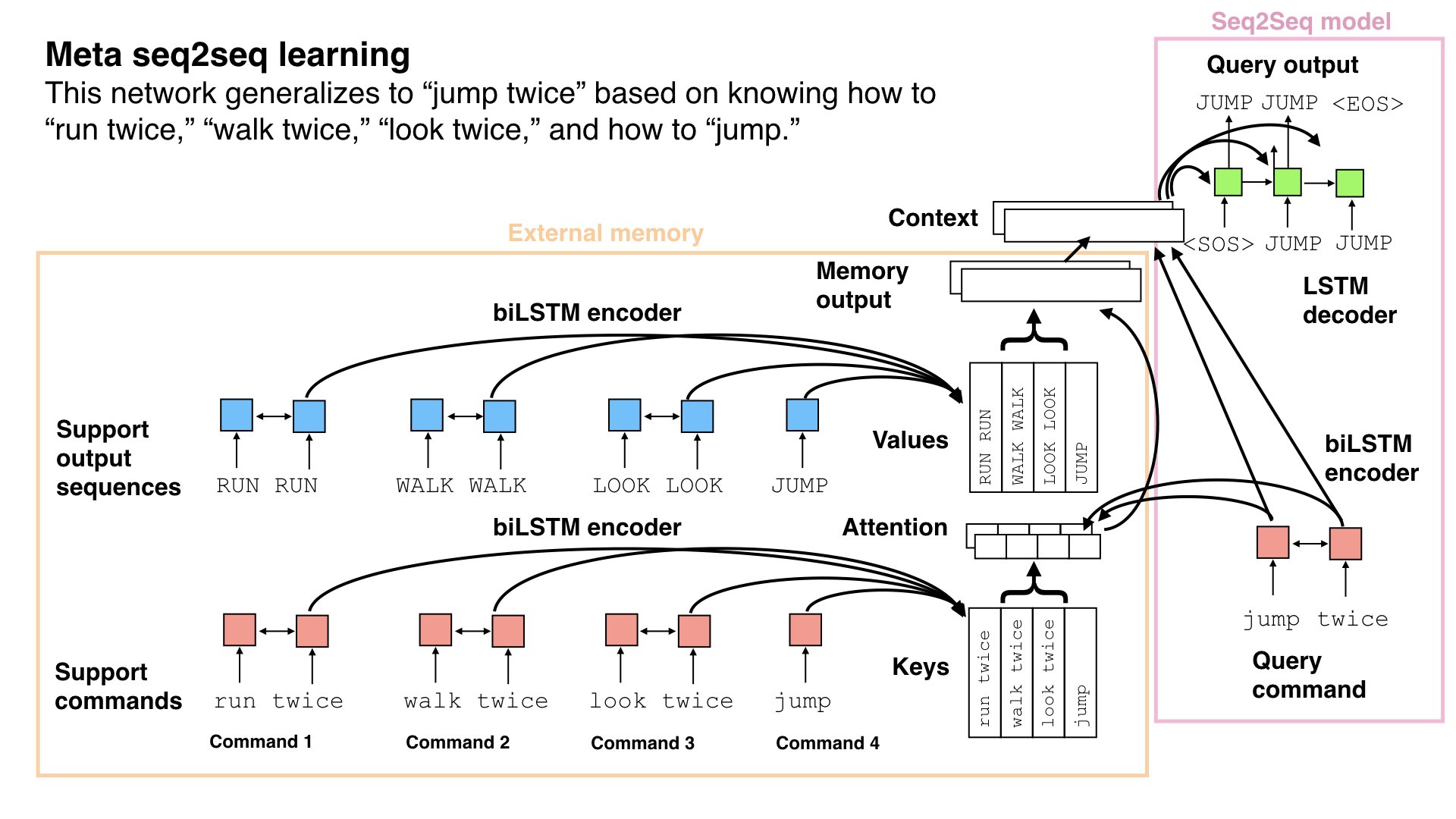facebookresearch / Meta_seq2seq
Programming Languages
PyTorch implementation of Meta Sequence-to-Sequence Learning
Meta seq2seq learning is a form of memory-based meta-learning for seq2seq models. Vanilla neural nets struggle with compositionality, but they can be improved through training on a series of seq2seq problems to acquire the compositional skills needed for solving new problems.

License
Please see the LICENSE for terms of use.
Citing this code
Please cite the following paper:
Lake, B. M. (2019). Compositional generalization through meta sequence-to-sequence learning. Advances in Neural Information Processing Systems.
I am grateful to Sean Robertson for his seq2seq tutorial which was the basis of the seq2seq code.
Pre-requisites
Python 3
numpy
PyTorch (developed on v1.0)
Using the code
Training a model
To run the model with default parameters from the NeurIPS paper, trained on the Mutual Exclusivity task, you can simply type:
python train.py
which will produce a file out_models/net_ME.tar.
Every 100 epochs the training script will print the time remaining as well as validation performance:
TrainLoss: 0.0017, ValAccRetrieval: 100.0, ValAccGeneralize: 100.0
Validation performance is based on held-out episodes, and split between retrieval and generalization accuracy. The measure ValAccRetrieval is for queries that are identical to support examples, and thus it simply evaluates retrieval from memory and not generalization. The measure ValAccGeneralize evaluates novel queries. Examples are correct only if the entire output sequence is correct.
Use the -h option to view arguments:
optional arguments:
-h, --help show this help message and exit
--num_episodes NUM_EPISODES
number of episodes for training
--lr LR ADAM learning rate
--lr_decay_schedule LR_DECAY_SCHEDULE
decrease learning rate by 1e-1 after this many
episodes
--nlayers NLAYERS number of layers in the LSTM
--max_length_eval MAX_LENGTH_EVAL
maximum generated sequence length when evaluating the
network
--emb_size EMB_SIZE size of sequence embedding (also, nhidden for encoder
and decoder LSTMs)
--dropout DROPOUT dropout applied to embeddings and LSTMs
--fn_out_model FN_OUT_MODEL
filename for saving the model
--dir_model DIR_MODEL
directory for saving model files
--episode_type EPISODE_TYPE
what type of episodes do we want
--disable_memory Disable external memory, ignore support set, and use
simple RNN encoder
--disable_attention Disable the decoder attention
--disable_recon_loss Disable reconstruction loss, where support items are
included also as query items
--gpu GPU set which GPU we want to use
The important argument --episode_type determines which experiment to run and can take the following values:
-
ME: NeurIPS Exp 1; Mutual exclusivity -
scan_prim_permutation: NeurIPS Exp 2; SCAN task; Adding a new primitive through permutation meta-training -
scan_prim_augmentation: NeurIPS Exp 3; SCAN task; Adding a new primitive through augmentation meta-training -
scan_around_right: NeurIPS Exp 4; SCAN task; Combining familiar concepts through meta-training -
scan_length: NeurIPS Exp 5; SCAN task; Generalizing to longer instructions through meta-training
Testing a model
Models trained on SCAN are evaluated using the test.py script
After running, say,
python train.py --episode_type scan_prim_permutation
which produces a file out_models/net_scan_prim_permutation.tar
Run the test script
python test.py --episode_type scan_prim_permutation --fn_in_model net_scan_prim_permutation.tar --dir_model out_models
to evaluate the model on the SCAN task as described in the paper, where the SCAN split is determined by the type of episode it was trained on.
The test.py script has arguments:
optional arguments:
-h, --help show this help message and exit
--fn_in_model FN_IN_MODEL
filename for saved model we want to load
--dir_model DIR_MODEL
directory of saved model file
--episode_type EPISODE_TYPE
